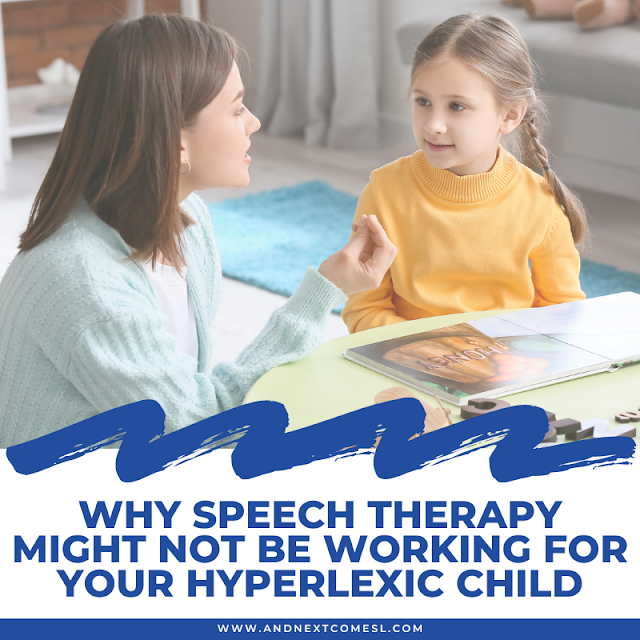Does it seem like your hyperlexic child isn't making progress as expected in speech therapy?
Maybe you've tried so many approaches and different therapists over the years, but nothing's working.
Perhaps your child has been attending therapy for years and it seems like your child is still stuck where they were when you first started.
It might even feel like you're just wasting money at this point.
But there's a simple explanation for why things might not be progressing as expected.
And it all has to do with the fact that most hyperlexic kids are gestalt language processors.
This post is an expanded version of this collaborative Instagram post that I did with @bohospeechie. It's an important topic that deserved a permanent place on the blog as well.
Why Speech Therapy Might Not Be Working for Your Hyperlexic Child
More often than not, the therapy that a hyperlexic child is receiving doesn't match how they learn and process language.
Remember, most (if not all) hyperlexic kids are gestalt language processors so they learn language in chunks.
Therefore, their therapy should focus on helping them break down those chunks (called gestalts) into smaller chunks and then eventually into single words. It's only at this point that they can they start to generate spontaneous language and use beginning grammar. This process is called Natural Language Acquisition.
The problem is though that hyperlexic kids often aren't receiving therapy that's tailored to their gestalt language learning.
Instead, they're frequently being treated as if they are an analytic language processor (they learn language in single words versus chunks).
When hyperlexic kids are treated as if they are an analytic language processor, important steps in the Natural Language Acquisition process end up being skipped.
As a result, a lot of the goals a therapist might set are inappropriate because they don't match the stage that the hyperlexic learner is actually in.
That means the therapist might set a goal that can only be achievable once the child is able to generate spontaneous language. However, the problem is that they've skipped the earlier stages of helping hyperlexic learners break down chunks into smaller chunks and single words and the child isn't yet ready to generate spontaneous language.
So, essentially the goals being set are for later stages in their language acquisition process even though the child is still in the first or second stage. In other words, they're not meeting the child where they actually are.
But why is this happening? Why aren't hyperlexic kids receiving the right approach to therapy?
Why Aren't Speech Therapists Using the Right Approach for Hyperlexic Kids Then?
Well, part of the problem is that a lot of speech therapists are still unfamiliar with gestalt language processing and the Natural Language Acquisition process. Unfortunately, it's not something they learned about during their education.
In other words, your child's speech therapist might not be aware of this type of language development. They're instead only familiar with how to treat analytic language processors, not gestalt language processors.
They've likely even been taught that echolalia is meaningless (it's not!) and should be ignored or discouraged (it shouldn't!).
So what now?
What Can You Do When Your Hyperlexic Child Isn't Making Progress as Expected?
Most importantly, parents and therapists need to recognize that echolalia is indeed meaningful communication and that communicating with echolalia is a sign that a child is learning language differently (i.e., they're a gestalt language processor).
You can't just use the methods you'd normally use for analytic language processors with these types of learners. They're not going to be effective.
Instead, hyperlexic kids need a different approach to therapy because they learn language differently.
Not only should the therapeutic approach consider how gestalt language processors develop language, but it should also incorporate the interests and strengths of the hyperlexic learner.
More specifically, the fact that hyperlexic kids can read should be leveraged during therapy. That means writing things down to support spoken language models. And that's not always happening.
With these points in mind, parents should look for a therapist who is familiar with gestalt language processing, Natural Language Acquisition, and hyperlexia. Parents themselves should also make sure they understand these three topics as well. It makes it easier to advocate and know what to look for when they do.
Now, if parents can't find a therapist familiar with gestalt language processing, then they can always talk to the therapist they currently do have and see if they would be interested in learning more about gestalt language processing. Perhaps both the parents and the therapist could take the Meaningful Speech course together, for instance (be sure to use coupon code DYAN to save 5%), as a way to learn more about it.
Parents should also request that the therapist set goals that are appropriate for their hyperlexic child and their stage of language development. If the parent notices inappropriate goals, then they should speak up and advocate accordingly.
Finally, parents should make sure that the therapist is incorporating the hyperlexic child's interests into therapy. Those interests shouldn't be withheld, discouraged, and/or used as rewards (learn more here). Instead, the therapist should look for ways to include those letters or numbers into therapy (tips here).
A Quick Recap of The Hyperlexic Child & a Lack of Progress in Speech Therapy
I know it can be frustrating to see your hyperlexic child not making progress as expected, but, when you find the right therapist and approach, it really makes a big difference. Here's a recap of what was discussed above:
- A hyperlexic child might not be making progress in speech therapy as expected because there's a mismatch between how they learn language and the therapy approached being used.
- Hyperlexic kids are gestalt language processors, but they often receive therapy that's geared towards analytic language processors, not gestalt processors.
- More often than not, this is happening because many speech therapists are still unfamiliar with gestalt language processing and even hyperlexia, for that matter.
- Parents and therapists need to recognize that echolalia is indeed meaningful communication and that a different way of learning language requires a different approach to therapy.
- Finding a speech therapist familiar with hyperlexia and gestalt language processing can be a challenge. But, if parents can't find a therapist familiar with these areas, they can always collaborate with their current speech therapist and learn about these topics together. Work as a team!
- Speech therapy for hyperlexic kids should focus on the Natural Language Acquisition process, leverage the child's strengths (especially their ability to read), incorporate their interests, and be tailored to how gestalt language processors learn language.
The right therapist and the right approach really makes a difference. And they can be the two biggest factors behind why speech therapy might not be working for your hyperlexic child.
Want to Learn More About Gestalt Language Processing?
If you'd like to learn more about gestalt language processing and Natural Language Acquisition, I highly recommend checking out the Meaningful Speech courses and their Gestalt Language Processing Handbook. Use coupon code DYAN to save 5% on the handbook or courses.
Learn more about the Gestalt Language Processing Handbook & Courses










